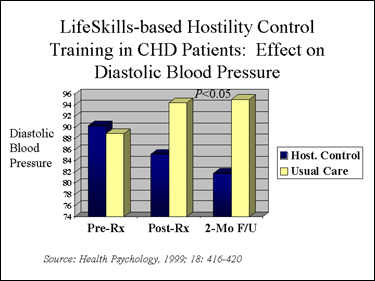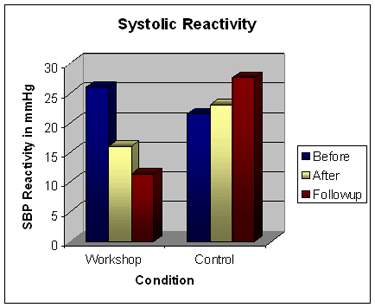Anger Kills…

The psychological, social and medical consequences of chronic stress and anger are well documented.
People who find themselves getting stressed or angry many times a day,
especially at little things are more likely …
… to develop high blood pressure or coronary heart disease by age 50;
… to die from any cause by age 50;
… to become depressed;
…. to have not satisfying relationships with other people;
… to suffer an injury on the job that causes them to miss time at work;
… to develop atrial fibrillation, a serious disturbance of the heart rhythm;
Have larger blood pressure and adrenalin surges when angry.
… Lifeskills Training protects!

The good news is that it is possible to learn how to manage your stress and anger better to lead healthier, happier lives at work and at home. Research has documented benefits from Williams LifeSkills training in both healthy people and those suffering from heart disease:
- Reduced levels of hostility and anger that are maintained over follow-up periods ranging from two to six month
- Reduced levels of depression and anxiety
- Increased satisfaction with one’s social supports
- Reduced blood pressure two to three months following the end of training
- Smaller blood pressure and heart rates surge when angered
The following slides of a study done by George Bishop. These were patients in Singapore who had coronary bypass surgery. Half were randomly assigned to a control group, the other half to a Williams LifeSkills workshop. You can see their scores were similar before treatment, but different right after treatment and still different – sometimes with additional improvement – at their three-month follow-up.
WLS Books
Scientific papers on WLS efficacy
WLS international overview
Williams RB, Williams VP. (2011) Adaptation and implementation of an evidence-based behavioral medicine program in diverse global settings: The Williams LifeSkills experience. Translational Behavioral Medicine 2011;1:303–312
WLS in North America
Barnes, V. A., Johnson, M. H., Williams, R. B., & Williams, V. P. (2012). Impact of Williams LifeSkills® training on anger, anxiety, and ambulatory blood pressure in adolescents. Translational Behavioral Medicine, 2(4), 401-410.
Williams VP, Bishop-Fitzpatrick L, Lane JD, Gwyther LP, Ballard EL, Vendittelli AP, Hutchins TC, Williams RB (2010) Video-based coping skills to reduce health risk and improve psychological and physical well-being in Alzheimer’s disease family caregivers. Psychosom Med. 2012 Nov;72(9):897-904.
Williams VP, Brenner SL, Helms MJ, Williams RB. Coping skills training to reduce psychosocial risk factors for medical disorders: a field trial evaluating effectiveness in multiple worksites. Occup Health. 2009;51(5):437-42 Erratum in: J Occup Health. 2009;51(6)
Campo AE, Williams VP, Williams RB, Segundo MA. Lydston D, Weiss SM. Effects of LifeSkills Training on Medical Students’ Performance in Dealing with Complex Clinical Cases. Academic Psychiatry 2008;32:188–194
Kirby E, Williams VP, Hocking MC, Lane JD, Williams RB (2006): Psychosocial benefits of three formats of a standardized behavioral stress management program. Psychosomatic Medicine 68:816-823
Gidron, Y., Davidson, K., Bata, I. (1999). The short-term effects of a hostility-reduction intervention on CHD patients. Health Psychol 18:416-420
WLS in Singapore
Bishop, G.D., Kaur, M., Tan, V.L.M., et al. (2002) Effects of a psychosocial skills training workshop on psychophysiological and psychosocial risk in patients undergoing coronary artery bypass grafting Am Heart J 2005;150:602- 9.
WLS in Hungary
Hornyák, B. (2017). Implementation of a behavioral medicine program in the Hungarian Defence Forces: The Williams LifeSkills experience I. Military Science Review 10(3).
Stauder A, Balog P, Kovács M, Susánszky É: A Williams ÉletKészségek® stresszkezelő és pszichoszociális készségfejlesztő program magyar adaptációja és 10 éves tapasztalatai.
Mentálhigiéné és Pszichoszomatika, 2016:17(2), 81-95)
Stauder A, Cserháti Z, Konkolÿ Thege B. Decreasing the negative effects of work-related stress in unchanged working environments. European Journal of Mental Health 2018 (13) 163-183
Stauder A, Konkolÿ Thege B, Kovács M E, Balog P, Williams V P, Williams R B. World wide stress: Different problems, similar solutions? Cultural adaptation and evaluation of a standardized stress management program in Hungary. Int J Behav Med. 2010;17(1): 25-32
Stauder A, Williams VP, Williams RB, Kopp MS. (2006): Hungarian adaptation of the Williams LifeSkills program: preliminary results among psychosomatic patients. (abstract) J Psychosomatic Research, 60(6): 663
WLS in China
Zhang, S., Wang, H., Chen, C., Zhou, J., Wang, X. (2015). Efficacy of Williams LifeSkills Training in improving psychological health of Chinese male juvenile violent offenders: a randomized controlled study. Neuroscience Bulletin, 31(1), 53-60.
WLS in Romania
Száva, Cs, Dégi, C. (2021). How body image affects cancer patients coping with the disease: based on Williams Lifeskills program experiences. Journal of School and University Medicine, 8 (3).














